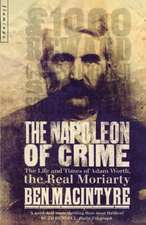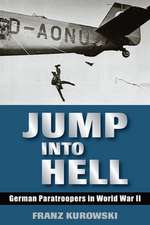Double Cross
Autor Ben Macintyreen Limba Engleză Paperback – 15 aug 2024
| Toate formatele și edițiile | Preț | Express |
|---|---|---|
| Paperback (2) | 65.42 lei 3-5 săpt. | +35.65 lei 6-12 zile |
| Bloomsbury Publishing – 15 aug 2024 | 65.42 lei 3-5 săpt. | +35.65 lei 6-12 zile |
| BROADWAY BOOKS – 13 mai 2013 | 110.96 lei 3-5 săpt. |
Preț: 65.42 lei
Preț vechi: 84.01 lei
-22% Nou
Puncte Express: 98
Preț estimativ în valută:
12.52€ • 13.64$ • 10.55£
12.52€ • 13.64$ • 10.55£
Carte disponibilă
Livrare economică 03-17 aprilie
Livrare express 19-25 martie pentru 45.64 lei
Preluare comenzi: 021 569.72.76
Specificații
ISBN-13: 9781526682659
ISBN-10: 1526682656
Pagini: 448
Dimensiuni: 131 x 198 x 43 mm
Greutate: 0.41 kg
Editura: Bloomsbury Publishing
ISBN-10: 1526682656
Pagini: 448
Dimensiuni: 131 x 198 x 43 mm
Greutate: 0.41 kg
Editura: Bloomsbury Publishing
Notă biografică
BEN MACINTYRE is a writer-at-large for The Times of London and the bestselling author of Operation Mincemeat, Agent Zigzag, The Napoleon of Crime, and Forgotten Fatherland, among other books.
Extras
1. Raw Recruits
Dusko and Johnny were friends. Their friendship was founded on a shared appreciation of money, cars, parties, and women, in no particular order and preferably all at the same time. Their relationship, based almost entirely on frivolity, would have a profound impact on world history.
Dusan “Dusko” Popov and Johann “Johnny” Jebsen met in 1936 at the University of Freiburg in southern Germany. Popov, the son of a wealthy Serbian industrialist from Dubrovnik, was twenty-five. Jebsen, the heir to a large shipping company, was two years older. Both were spoiled, charming, and feckless. Popov drove a BMW; Jebsen, a supercharged Mercedes 540K convertible. This inseparable pair of international playboys roistered around Freiburg, behaving badly. Popov was a law student, while Jebsen was taking an economics degree, the better to manage the family firm. Neither did any studying at all. “We both had some intellectual pretensions,” wrote Popov, but “[we were] addicted to sports cars and sporting girls and had enough money to keep them both running.”
Popov had a round, open face, with hair brushed back from a high forehead. Opinion was divided on his looks: “He smiles freely showing all his teeth and in repose his face is not unpleasant, though certainly not handsome,” wrote one male contemporary. He had “a well-flattened, typically Slav nose, complexion sallow, broad shoulders, athletic carriage, but rather podgy, white and well-kept hands,” which he waved in wild gesticulation. Women frequently found him irresistible, with his easy manners, “loose, sensual mouth,” and green eyes behind heavy lids. He had what were then known as “bedroom eyes”; indeed, the bedroom was his main focus of interest. Popov was an unstoppable womanizer. Jebsen cut a rather different figure. He was slight and thin, with dark blond hair, high cheekbones, and a turned‑up nose. Where Popov was noisily gregarious, Jebsen was watchful. “His coldness, aloofness, could be forbidding, yet everyone was under his spell,” Popov wrote. “He had much warmth too, and his intelligence was reflected in his face, in the alertness of his steel-blue eyes. He spoke abruptly, in short phrases, hardly ever used an adjective and was, above all, ironic.” Jebsen walked with a limp and hinted that this was from an injury sustained in some wild escapade: in truth it was caused by the pain of varicose veins, to which he was a secret martyr. He loved to spin a story, to “deliberately stir up situations to see what would happen.” But he also liked to broker deals. When Popov was challenged to a sword duel over a girl, it was Jebsen, as his second, who quietly arranged a peaceful solution, to Popov’s relief, “not thinking my looks would be improved by a bright red cicatrix.”
Jebsen’s parents, both dead by the time he arrived in Freiburg, had been born in Denmark but adopted German citizenship when the shipping firm Jebsen & Jebsen moved to Hamburg. Jebsen was born in that city in 1917 but liked to joke that he was really Danish, his German citizenship being a “flag of convenience” for business purposes: “Some of my love of my country has to do with so much of it actually belonging to me.” A rich, rootless orphan, Jebsen had visited Britain as a teenager and returned a committed Anglophile: he affected English manners, spoke English in preference to German, and dressed, he thought, “like a young Anthony Eden, conservatively elegant.” Popov remarked: “He would no more go without an umbrella than without his trousers.”
Preoccupied as they were with having fun, the two student friends could not entirely ignore the menacing political changes taking place around them in the Germany of the 1930s. They made a point of teasing the “pro-Nazi student intelligentsia.” The mockery, however, had a metal strand to it. “Under that mask of a snob and cynic and under his playboy manners,” Jebsen was developing a deep distaste for Nazism. Popov found the posturing Nazi Brownshirts ridiculous and repulsive.
After graduation, Popov returned to Yugoslavia and set himself up in the import-export business, traveling widely. Jebsen headed to England, announcing that he intended to study at Oxford University and write books on philosophy. He did neither (though he would later claim to have done both). They would not meet again for three years, by which time the world was at war.
In early 1940, Popov was living in Dubrovnik, where he had opened his own law firm, and conducting affairs with at least four women, when he received a telegram from his old friend summoning him to Belgrade: “Need to meet you urgently.” Their reunion was joyful and spectacularly bibulous. They went on a bender through Belgrade’s nightspots, having enlisted “two girls from the chorus of one of the clubs.” At dawn, all four sat down to a breakfast of steak and champagne. Jebsen told Popov that in the intervening years, he had become acquainted with the great English writer P. G. Wodehouse. With his monocle and silk cravat, Jebsen now looked like an oddly Germanic version of Bertie Wooster. Popov studied his old friend. Jebsen wore the same expression of “sharp intelligence, cynicism and dark humour,” but he also seemed tense, as if there was something weighing on his mind. He chain-smoked and “ordered his whiskies double, neat, and frequently. In style, his clothes still rivalled Eden’s, but his blond hair was no longer so closely trimmed and he had a neglected moustache, reddened by tobacco.”
A few days later, the friends were alone at the bar of a Belgrade hotel, when Jebsen lowered his voice, looked around in a ludicrously conspiratorial manner, and confided that he had joined the Abwehr, the German military intelligence service, “because it saved him from soldiering, of which he was very much afraid as he is a heavy sufferer from varicose veins.” Jebsen’s recruiter was a family friend, Colonel Hans Oster, deputy to Admiral Wilhelm Canaris, the chief of the Abwehr. He now had the formal but vague Abwehr title of “Forscher,” meaning researcher or talent scout, with the technical rank of private, attached to a four-hundred-strong special detachment of the Brandenburg Regiment. This unit was in reality “a wangle by Canaris to keep a number of young men out of the clutches of compulsory service.” Jebsen was a freelance spy on permanent leave from the army, with a personal assurance from Canaris that he would never wear a uniform, never undergo military training, and never be sent to war. He was free to spend his “time travelling throughout Europe on his private business and financial affairs, so long as he held himself available to help the Abwehr when called upon to do so.”
“Hitler is the undisputed master of Europe,” Jebsen declared. “In a few months’ time, he’ll probably finish off England, and then America and Russia will be glad to come to terms with him.” This was pure Nazi propaganda, but Jebsen’s expression, as usual, was glintingly ironic. “Would you dine with a friend of mine,” Jebsen asked suddenly, “a member of the German embassy?” The friend turned out to be one Major Müntzinger, a corpulent Bavarian and the most senior Abwehr officer in the Balkans. Over brandy and cigars, Müntzinger made his pitch to Popov, as subtle as a sledgehammer. “No country can resist the German army. In a couple of months, England will be invaded. To facilitate the German task and to make an eventual invasion less bloody, you could help.” Müntzinger shifted to flattery. Popov was well connected. His business was the ideal cover for traveling to Britain, where he must know many important and influential people. Why, did he not know the Duke of Kent himself? Popov nodded. (He did not admit that he had visited Britain only once in his life and had met the duke for a matter of minutes at Dubrovnik’s Argosy Yacht Club.) Müntzinger continued: “We have many agents in England, quite a number of them excellent. But your connections would open many doors. You could render us great service. And we could do the same for you. The Reich knows how to show its appreciation.” Jebsen drank his whiskey and said nothing. Müntzinger was somewhat vague about the kind of information Popov might gather: “General. Political.” And then, after a pause: “Military. Johnny will introduce you to the proper people when and if you accept.” Popov asked for time to think the offer over, and in the morning he accepted. Jebsen had recruited his first spy for German intelligence. He would never recruit another.
Popov, meanwhile, had begun to develop what he called “a little idea of my own.”
In 1941, the Interallié was the most important spy network in Nazi-occupied France. Indeed, as one British intelligence officer remarked, it was virtually the only one, “our sole source of information from France” in the early part of the war. The network consisted of scores of informers, agents, and subagents, but ultimately the Interallié was the creation of one spy, a man to whom conspiracy and subterfuge were second nature, who regarded espionage as a vocation. His French collaborators knew him as Armand Borni; he also used the code name “Walenty,” or Valentine. His real name was Roman Czerniawski, and in a very short time, through sheer energy, conviction, and a soaring sense of his own worth, he had become the most valuable British spy in France.
Czerniawski was a Polish patriot, but that phrase cannot do justice to his essential Polishness and the depths of his attachment to his motherland. He lived for Poland and was perfectly prepared (at times almost anxious) to die for it. “His loyalty is entirely to his own country, and every problem he sees is bound up with the destiny of the Polish people,” wrote one of his fellow spies. He loathed the Germans and Russians with equal intensity for carving up his country, and dreamed only of restoring the Polish nation. Every other loyalty, every other consideration, was secondary. He stood just five foot six inches tall, with a thin face and intense, close-set eyes. He smiled readily and spoke at machine-gun speed.
The son of a well-to-do Warsaw financier, Czerniawski had trained as a fighter pilot before the war, but a serious crash had left him partially sighted and deskbound. The German invasion of Poland in September 1939 found Captain Czerniawski at air force headquarters in Warsaw, a specialist in military intelligence and the author of a well-received treatise on counterintelligence. Czerniawski was a professional, “a man who lives and thinks spying,” as one colleague put it. He regarded the spy trade as an honorable calling “based on the highest ideals of human endeavour.” As the Polish army crumbled beneath the German onslaught, Czerniawski escaped to Romania and then, using forged documents, made his way to France, where Polish forces were regrouping. When France fell in 1940, his division was disbanded, but rather than join his compatriots in Britain to continue the fight from there, Czerniawski went underground. He persuaded a young French widow, Renée Borni, to lend him her late husband’s identity. As German troops began their occupation, a peasant whose papers identified him as Armand Borni wobbled along beside them on a borrowed bicycle, taking mental notes and already congratulating himself. “Every signpost, every sign on a truck, every distinguishing mark of any sort, meant far more to me than to anybody else.” Here were the seeds of what he would grandly refer to as his “vision.” While the Polish government-in-exile in London fought one kind of war, he would mount another. He imagined “small cells of resistance, multiplying with great speed, joining together and forming one screen of eyes.”
Czerniawski made his way to the unoccupied south of France, where he made contact with the Polish secret service and obtained formal approval for his plan to establish a network in the occupied zone. A few nights later, he was dining alone at La Frégate, a restaurant in Toulouse, when a young woman asked if she might occupy the empty seat at his table. “She was small, in her thirties. Her pale, thin face, with thin lips, was animated by very vivid eyes.” Mathilde Carré simultaneously sized up her diminutive and accidental dining companion: “Thin and muscular, with a long narrow face, rather large nose and green eyes which must originally have been clear and attractive but were now flecked with contusions as the result of a flying accident.” Czerniawski introduced himself “in an appalling French accent.” They fell into conversation. After dinner he walked her home.
Mathilde Carré was highly intelligent, overwrought, and, at the moment she met Czerniawski, teetering on the edge of a nervous breakdown. The child of bourgeois Parisian parents, she had studied at the Sorbonne, worked briefly in an insurance company, trained as a teacher, and then married a childhood friend before swiftly discovering she could not stand him. The war was the excuse she needed to leave her husband. With the French army in retreat, she found work in a dressing station, treating the wounded. There she met a lieutenant in the French Foreign Legion and made love to him “under the eyes of an enormous crucifix” in the bishop’s cell of a seminary at Cazères sur Garonne. He was gone in the morning, and she was pregnant. She decided to keep the baby and then miscarried. One night, she stood on a high bridge, about to kill herself, but then changed her mind: “Instead of throwing myself into the Garonne, I would fling myself into the war. If I really intended to commit suicide, it would be more intelligent to commit a useful suicide.” To celebrate this decision, she had taken herself out to dinner at La Frégate.
Czerniawski’s abundant self-assurance made Mathilde feel instantly secure. “Every time he spoke of the war his eyes flashed. He would not accept that Poland had been defeated. He radiated a kind of confidence and the enthusiasm of youth, an intelligence and willpower which would alternately give place to the airs of a spoilt, affectionate child.” They met again the next night, and the next. “A great bond of friendship was swiftly forged.” Both would later deny they had ever been lovers with such vehemence that the denials were almost certainly untrue.
Three weeks after their first meeting, Czerniawski confessed that he was a spy and asked Mathilde to help him realize his “vision” of a multicelled intelligence network. She said he could count on her; together they would “do great things.” The theatricality of the moment was compounded by Czerniawski’s announcement that he had already selected a code name for his new accomplice: she would be “La Chatte,” the She-Cat, because “you walk so quietly, in your soft shoes, like a cat.” She raised the slim fingers of one hand in a claw: “And I can scratch as well if I wish.” Perhaps it was a warning.
Roman Czerniawski and Mathilde Carré formed a most effective spy partnership. In Paris, they rented a room in Montmartre and set about constructing an entire espionage network. “It will be inter-Allied,” Czerniawski announced. “The boss will be a Pole, the agents mostly French, and all working for the Allies.” The Interallié network was born.
Dusko and Johnny were friends. Their friendship was founded on a shared appreciation of money, cars, parties, and women, in no particular order and preferably all at the same time. Their relationship, based almost entirely on frivolity, would have a profound impact on world history.
Dusan “Dusko” Popov and Johann “Johnny” Jebsen met in 1936 at the University of Freiburg in southern Germany. Popov, the son of a wealthy Serbian industrialist from Dubrovnik, was twenty-five. Jebsen, the heir to a large shipping company, was two years older. Both were spoiled, charming, and feckless. Popov drove a BMW; Jebsen, a supercharged Mercedes 540K convertible. This inseparable pair of international playboys roistered around Freiburg, behaving badly. Popov was a law student, while Jebsen was taking an economics degree, the better to manage the family firm. Neither did any studying at all. “We both had some intellectual pretensions,” wrote Popov, but “[we were] addicted to sports cars and sporting girls and had enough money to keep them both running.”
Popov had a round, open face, with hair brushed back from a high forehead. Opinion was divided on his looks: “He smiles freely showing all his teeth and in repose his face is not unpleasant, though certainly not handsome,” wrote one male contemporary. He had “a well-flattened, typically Slav nose, complexion sallow, broad shoulders, athletic carriage, but rather podgy, white and well-kept hands,” which he waved in wild gesticulation. Women frequently found him irresistible, with his easy manners, “loose, sensual mouth,” and green eyes behind heavy lids. He had what were then known as “bedroom eyes”; indeed, the bedroom was his main focus of interest. Popov was an unstoppable womanizer. Jebsen cut a rather different figure. He was slight and thin, with dark blond hair, high cheekbones, and a turned‑up nose. Where Popov was noisily gregarious, Jebsen was watchful. “His coldness, aloofness, could be forbidding, yet everyone was under his spell,” Popov wrote. “He had much warmth too, and his intelligence was reflected in his face, in the alertness of his steel-blue eyes. He spoke abruptly, in short phrases, hardly ever used an adjective and was, above all, ironic.” Jebsen walked with a limp and hinted that this was from an injury sustained in some wild escapade: in truth it was caused by the pain of varicose veins, to which he was a secret martyr. He loved to spin a story, to “deliberately stir up situations to see what would happen.” But he also liked to broker deals. When Popov was challenged to a sword duel over a girl, it was Jebsen, as his second, who quietly arranged a peaceful solution, to Popov’s relief, “not thinking my looks would be improved by a bright red cicatrix.”
Jebsen’s parents, both dead by the time he arrived in Freiburg, had been born in Denmark but adopted German citizenship when the shipping firm Jebsen & Jebsen moved to Hamburg. Jebsen was born in that city in 1917 but liked to joke that he was really Danish, his German citizenship being a “flag of convenience” for business purposes: “Some of my love of my country has to do with so much of it actually belonging to me.” A rich, rootless orphan, Jebsen had visited Britain as a teenager and returned a committed Anglophile: he affected English manners, spoke English in preference to German, and dressed, he thought, “like a young Anthony Eden, conservatively elegant.” Popov remarked: “He would no more go without an umbrella than without his trousers.”
Preoccupied as they were with having fun, the two student friends could not entirely ignore the menacing political changes taking place around them in the Germany of the 1930s. They made a point of teasing the “pro-Nazi student intelligentsia.” The mockery, however, had a metal strand to it. “Under that mask of a snob and cynic and under his playboy manners,” Jebsen was developing a deep distaste for Nazism. Popov found the posturing Nazi Brownshirts ridiculous and repulsive.
After graduation, Popov returned to Yugoslavia and set himself up in the import-export business, traveling widely. Jebsen headed to England, announcing that he intended to study at Oxford University and write books on philosophy. He did neither (though he would later claim to have done both). They would not meet again for three years, by which time the world was at war.
In early 1940, Popov was living in Dubrovnik, where he had opened his own law firm, and conducting affairs with at least four women, when he received a telegram from his old friend summoning him to Belgrade: “Need to meet you urgently.” Their reunion was joyful and spectacularly bibulous. They went on a bender through Belgrade’s nightspots, having enlisted “two girls from the chorus of one of the clubs.” At dawn, all four sat down to a breakfast of steak and champagne. Jebsen told Popov that in the intervening years, he had become acquainted with the great English writer P. G. Wodehouse. With his monocle and silk cravat, Jebsen now looked like an oddly Germanic version of Bertie Wooster. Popov studied his old friend. Jebsen wore the same expression of “sharp intelligence, cynicism and dark humour,” but he also seemed tense, as if there was something weighing on his mind. He chain-smoked and “ordered his whiskies double, neat, and frequently. In style, his clothes still rivalled Eden’s, but his blond hair was no longer so closely trimmed and he had a neglected moustache, reddened by tobacco.”
A few days later, the friends were alone at the bar of a Belgrade hotel, when Jebsen lowered his voice, looked around in a ludicrously conspiratorial manner, and confided that he had joined the Abwehr, the German military intelligence service, “because it saved him from soldiering, of which he was very much afraid as he is a heavy sufferer from varicose veins.” Jebsen’s recruiter was a family friend, Colonel Hans Oster, deputy to Admiral Wilhelm Canaris, the chief of the Abwehr. He now had the formal but vague Abwehr title of “Forscher,” meaning researcher or talent scout, with the technical rank of private, attached to a four-hundred-strong special detachment of the Brandenburg Regiment. This unit was in reality “a wangle by Canaris to keep a number of young men out of the clutches of compulsory service.” Jebsen was a freelance spy on permanent leave from the army, with a personal assurance from Canaris that he would never wear a uniform, never undergo military training, and never be sent to war. He was free to spend his “time travelling throughout Europe on his private business and financial affairs, so long as he held himself available to help the Abwehr when called upon to do so.”
“Hitler is the undisputed master of Europe,” Jebsen declared. “In a few months’ time, he’ll probably finish off England, and then America and Russia will be glad to come to terms with him.” This was pure Nazi propaganda, but Jebsen’s expression, as usual, was glintingly ironic. “Would you dine with a friend of mine,” Jebsen asked suddenly, “a member of the German embassy?” The friend turned out to be one Major Müntzinger, a corpulent Bavarian and the most senior Abwehr officer in the Balkans. Over brandy and cigars, Müntzinger made his pitch to Popov, as subtle as a sledgehammer. “No country can resist the German army. In a couple of months, England will be invaded. To facilitate the German task and to make an eventual invasion less bloody, you could help.” Müntzinger shifted to flattery. Popov was well connected. His business was the ideal cover for traveling to Britain, where he must know many important and influential people. Why, did he not know the Duke of Kent himself? Popov nodded. (He did not admit that he had visited Britain only once in his life and had met the duke for a matter of minutes at Dubrovnik’s Argosy Yacht Club.) Müntzinger continued: “We have many agents in England, quite a number of them excellent. But your connections would open many doors. You could render us great service. And we could do the same for you. The Reich knows how to show its appreciation.” Jebsen drank his whiskey and said nothing. Müntzinger was somewhat vague about the kind of information Popov might gather: “General. Political.” And then, after a pause: “Military. Johnny will introduce you to the proper people when and if you accept.” Popov asked for time to think the offer over, and in the morning he accepted. Jebsen had recruited his first spy for German intelligence. He would never recruit another.
Popov, meanwhile, had begun to develop what he called “a little idea of my own.”
In 1941, the Interallié was the most important spy network in Nazi-occupied France. Indeed, as one British intelligence officer remarked, it was virtually the only one, “our sole source of information from France” in the early part of the war. The network consisted of scores of informers, agents, and subagents, but ultimately the Interallié was the creation of one spy, a man to whom conspiracy and subterfuge were second nature, who regarded espionage as a vocation. His French collaborators knew him as Armand Borni; he also used the code name “Walenty,” or Valentine. His real name was Roman Czerniawski, and in a very short time, through sheer energy, conviction, and a soaring sense of his own worth, he had become the most valuable British spy in France.
Czerniawski was a Polish patriot, but that phrase cannot do justice to his essential Polishness and the depths of his attachment to his motherland. He lived for Poland and was perfectly prepared (at times almost anxious) to die for it. “His loyalty is entirely to his own country, and every problem he sees is bound up with the destiny of the Polish people,” wrote one of his fellow spies. He loathed the Germans and Russians with equal intensity for carving up his country, and dreamed only of restoring the Polish nation. Every other loyalty, every other consideration, was secondary. He stood just five foot six inches tall, with a thin face and intense, close-set eyes. He smiled readily and spoke at machine-gun speed.
The son of a well-to-do Warsaw financier, Czerniawski had trained as a fighter pilot before the war, but a serious crash had left him partially sighted and deskbound. The German invasion of Poland in September 1939 found Captain Czerniawski at air force headquarters in Warsaw, a specialist in military intelligence and the author of a well-received treatise on counterintelligence. Czerniawski was a professional, “a man who lives and thinks spying,” as one colleague put it. He regarded the spy trade as an honorable calling “based on the highest ideals of human endeavour.” As the Polish army crumbled beneath the German onslaught, Czerniawski escaped to Romania and then, using forged documents, made his way to France, where Polish forces were regrouping. When France fell in 1940, his division was disbanded, but rather than join his compatriots in Britain to continue the fight from there, Czerniawski went underground. He persuaded a young French widow, Renée Borni, to lend him her late husband’s identity. As German troops began their occupation, a peasant whose papers identified him as Armand Borni wobbled along beside them on a borrowed bicycle, taking mental notes and already congratulating himself. “Every signpost, every sign on a truck, every distinguishing mark of any sort, meant far more to me than to anybody else.” Here were the seeds of what he would grandly refer to as his “vision.” While the Polish government-in-exile in London fought one kind of war, he would mount another. He imagined “small cells of resistance, multiplying with great speed, joining together and forming one screen of eyes.”
Czerniawski made his way to the unoccupied south of France, where he made contact with the Polish secret service and obtained formal approval for his plan to establish a network in the occupied zone. A few nights later, he was dining alone at La Frégate, a restaurant in Toulouse, when a young woman asked if she might occupy the empty seat at his table. “She was small, in her thirties. Her pale, thin face, with thin lips, was animated by very vivid eyes.” Mathilde Carré simultaneously sized up her diminutive and accidental dining companion: “Thin and muscular, with a long narrow face, rather large nose and green eyes which must originally have been clear and attractive but were now flecked with contusions as the result of a flying accident.” Czerniawski introduced himself “in an appalling French accent.” They fell into conversation. After dinner he walked her home.
Mathilde Carré was highly intelligent, overwrought, and, at the moment she met Czerniawski, teetering on the edge of a nervous breakdown. The child of bourgeois Parisian parents, she had studied at the Sorbonne, worked briefly in an insurance company, trained as a teacher, and then married a childhood friend before swiftly discovering she could not stand him. The war was the excuse she needed to leave her husband. With the French army in retreat, she found work in a dressing station, treating the wounded. There she met a lieutenant in the French Foreign Legion and made love to him “under the eyes of an enormous crucifix” in the bishop’s cell of a seminary at Cazères sur Garonne. He was gone in the morning, and she was pregnant. She decided to keep the baby and then miscarried. One night, she stood on a high bridge, about to kill herself, but then changed her mind: “Instead of throwing myself into the Garonne, I would fling myself into the war. If I really intended to commit suicide, it would be more intelligent to commit a useful suicide.” To celebrate this decision, she had taken herself out to dinner at La Frégate.
Czerniawski’s abundant self-assurance made Mathilde feel instantly secure. “Every time he spoke of the war his eyes flashed. He would not accept that Poland had been defeated. He radiated a kind of confidence and the enthusiasm of youth, an intelligence and willpower which would alternately give place to the airs of a spoilt, affectionate child.” They met again the next night, and the next. “A great bond of friendship was swiftly forged.” Both would later deny they had ever been lovers with such vehemence that the denials were almost certainly untrue.
Three weeks after their first meeting, Czerniawski confessed that he was a spy and asked Mathilde to help him realize his “vision” of a multicelled intelligence network. She said he could count on her; together they would “do great things.” The theatricality of the moment was compounded by Czerniawski’s announcement that he had already selected a code name for his new accomplice: she would be “La Chatte,” the She-Cat, because “you walk so quietly, in your soft shoes, like a cat.” She raised the slim fingers of one hand in a claw: “And I can scratch as well if I wish.” Perhaps it was a warning.
Roman Czerniawski and Mathilde Carré formed a most effective spy partnership. In Paris, they rented a room in Montmartre and set about constructing an entire espionage network. “It will be inter-Allied,” Czerniawski announced. “The boss will be a Pole, the agents mostly French, and all working for the Allies.” The Interallié network was born.
Recenzii
“Gripping stories from the perspective of a remarkable ragtag group of spies who tricked the Nazis in an astounding D-Day deception. Puts other spy tales to shame.” —People
“It should be said loud and clear that Macintyre is a supremely gifted storyteller. He spins quite a yarn. His books are absurdly entertaining. I would kill for his keen wit. He takes us into a world of bounders, spivs, roués, and men (and women) on the make….Double Cross is a blast.”
—Boston Globe
“Forget fiction when you are buying beach reading this summer. Ben Macintyre’s factual account is more gripping than what you will find anywhere else. It is a story unsurpassed in the long history of intelligence.”
—Washington Times
“Macintyre at once exalts and subverts the myths of spycraft, and has a keen eye for absurdity”
—New Yorker
“[A] complex, absorbing final installment in his trilogy about World War II espionage….Macintyre is a master storyteller. Employing a wry wit and a keen eye for detail, he delivers an ultimately winning tale fraught with European intrigue and subtle wartime heroics.”
—San Francisco Chronicle
“Superb….the story comes alive again in all its stupendous, unimaginable duplicity.…intensely readable”
—Washington Post
“A wonderfully entertaining story of deception and trickery that is told with verve and wit….Macintyre’s early books about espionage in World War II have been bestsellers, and this will be no exception.”
—Christian Science Monitor
“Macintyre revels in the surreal aspects of his story, writing with a breezy, almost tongue-in-cheek style. But the author is also adept at communicating the seriousness and the stakes of the underlying game….Nail-biting and chuckle-inducing reading.”
—Columbus Dispatch
“Another captivating, improbably fresh story of World War II….Double Cross is ennobling, invigorating and, above all, entertaining. Macintyre's research is impressive, as is his ability to shape disparate facts into a breathless page-turner….Throw in nail-biting suspense and the occasional decadent Nazi (fickle mistress optional) and, with Macintyre in charge, you're virtually guaranteed a history book that reads like a spy novel.”
—Richmond Times-Dispatch
“It is the riveting tales of these agents on which Ben Macintyre focuses, to full advantage, in Double Cross….Macintyre makes good use of the material. He knows how to let the high drama unfold on its own.”
—Wall Street Journal
“London Times writer Macintyre (Agent Zigzag, Operation Mincemeat) concludes his WWII espionage trilogy with the tantalizing tale of an oddball, ‘Dirty Dozen’-like group of double agents who fool the Nazis into believing the Allied D-Day attack would come at Calais, not Normandy.”
—New York Post, Required reading
“A tale of smarts, personal courage and — even knowing what happened on June 6, 1944 — suspense. Where would we be if these troubled, eccentric and hang-it-all characters hadn't known how to lie, and lie well?”
—Seattle Times
“As in his earlier best-sellers about WWII-era spycraft, Agent Zigzag and Operation Mincemeat, Macintyre writes with novelistic flair.”
—Entertainment Weekly
“The story of D-Day ߝ when 150,000 Allied troops landed on the beaches of Normandy ߝ as it’s never been told before….this amazing story shows how double agents and spies tricked the German army and saved thousands of Allied lives.”
—New York Post
“Only with author Ben Macintyre’s scintillating account has this complex human drama, with all its tortuous twists and turns, finally received the cinematic treatment it deserves….This is edge-of-the seat stuff.”
—WWII Magazine
“Macintyre does a fine job depicting this extraordinary cast and exposing the ambiguous world of espionage....compelling.”
—MHQ: The Quarterly Journal of Military History
“With the same skill and suspense he displayed in Operation Mincemeat and Agent Zigzag….Macintyre effortlessly weaves the agents’ deliciously eccentric personalities with larger wartime events to shape a tale that reads like a top-notch spy thriller.”
—Publishers Weekly (starred)
“Macintyre has written a tense, exciting real-life spy story that illuminates a largely obscure aspect of WWII.”
—Booklist
“With his latest book, Double Cross, Ben Macintyre tells the astonishing true story of a bizarre group of misfit spies who played a critical role in the success of D-Day. The stories in this book, many of which have never before been told, are nothing short of incredible. Skillfully woven together, they form one of the most gripping narratives I have ever read.”
—Candice Millard, author of The River of Doubt and Destiny of the Republic
“Ben Macintyre and I work in the same period, and I should be reading him because he is such a scrupulous and insightful writer ߝ a master historian. But, with Double Cross and his other excellent works, I always wind up reading him for pleasure. Double Cross may be his best yet, falling somewhere between top-class entertainment and pure addiction.”
—Alan Furst, author of A Mission to Paris
"Ben Macintyre’s spellbinding account features an improbable cast of characters who pulled off a counter-intelligence feat that was breathtaking in its audacity. Their deceptions within deceptions—known as the Double Cross—were critical to the success of the D-Day invasion, and continued to mislead the Germans long after Allied troops landed on the beaches of Normandy. A truly bravura performance, as is Macintyre’s fast-paced tale."
—Andrew Nagorski, author of Hitlerland: American Eyewitnesses to the Nazi Rise to Power
"How on earth, in 1944, did we dupe Berlin that we would attack the coast of France in completely the wrong place? It was a deception that saved tens of thousands of Allied lives. In Double Cross, Ben Macintyre ingeniously explains exactly how it was done."
—Frederick Forsyth
"Never before revealed facts about the workings of the Intelligence Service in the build up to D-Day in the Second World War. Ben Macintyre's remarkable book is a gripping revelation."
—Jack Higgins
“[Macintyre] has excelled himself with a cast of extraordinary characters and in his storytelling abilities....Double Cross is an utterly gripping story.”
—Antony Beevor, The Telegraph
“Enthralling....Macintyre is a master at leading the reader down some very tortuous paths while ensuring they never lose their bearings. He’s terrific, too, at animating his characters with the most succinct of touches....gripping.”
—London Evening Standard
“It should be said loud and clear that Macintyre is a supremely gifted storyteller. He spins quite a yarn. His books are absurdly entertaining. I would kill for his keen wit. He takes us into a world of bounders, spivs, roués, and men (and women) on the make….Double Cross is a blast.”
—Boston Globe
“Forget fiction when you are buying beach reading this summer. Ben Macintyre’s factual account is more gripping than what you will find anywhere else. It is a story unsurpassed in the long history of intelligence.”
—Washington Times
“Macintyre at once exalts and subverts the myths of spycraft, and has a keen eye for absurdity”
—New Yorker
“[A] complex, absorbing final installment in his trilogy about World War II espionage….Macintyre is a master storyteller. Employing a wry wit and a keen eye for detail, he delivers an ultimately winning tale fraught with European intrigue and subtle wartime heroics.”
—San Francisco Chronicle
“Superb….the story comes alive again in all its stupendous, unimaginable duplicity.…intensely readable”
—Washington Post
“A wonderfully entertaining story of deception and trickery that is told with verve and wit….Macintyre’s early books about espionage in World War II have been bestsellers, and this will be no exception.”
—Christian Science Monitor
“Macintyre revels in the surreal aspects of his story, writing with a breezy, almost tongue-in-cheek style. But the author is also adept at communicating the seriousness and the stakes of the underlying game….Nail-biting and chuckle-inducing reading.”
—Columbus Dispatch
“Another captivating, improbably fresh story of World War II….Double Cross is ennobling, invigorating and, above all, entertaining. Macintyre's research is impressive, as is his ability to shape disparate facts into a breathless page-turner….Throw in nail-biting suspense and the occasional decadent Nazi (fickle mistress optional) and, with Macintyre in charge, you're virtually guaranteed a history book that reads like a spy novel.”
—Richmond Times-Dispatch
“It is the riveting tales of these agents on which Ben Macintyre focuses, to full advantage, in Double Cross….Macintyre makes good use of the material. He knows how to let the high drama unfold on its own.”
—Wall Street Journal
“London Times writer Macintyre (Agent Zigzag, Operation Mincemeat) concludes his WWII espionage trilogy with the tantalizing tale of an oddball, ‘Dirty Dozen’-like group of double agents who fool the Nazis into believing the Allied D-Day attack would come at Calais, not Normandy.”
—New York Post, Required reading
“A tale of smarts, personal courage and — even knowing what happened on June 6, 1944 — suspense. Where would we be if these troubled, eccentric and hang-it-all characters hadn't known how to lie, and lie well?”
—Seattle Times
“As in his earlier best-sellers about WWII-era spycraft, Agent Zigzag and Operation Mincemeat, Macintyre writes with novelistic flair.”
—Entertainment Weekly
“The story of D-Day ߝ when 150,000 Allied troops landed on the beaches of Normandy ߝ as it’s never been told before….this amazing story shows how double agents and spies tricked the German army and saved thousands of Allied lives.”
—New York Post
“Only with author Ben Macintyre’s scintillating account has this complex human drama, with all its tortuous twists and turns, finally received the cinematic treatment it deserves….This is edge-of-the seat stuff.”
—WWII Magazine
“Macintyre does a fine job depicting this extraordinary cast and exposing the ambiguous world of espionage....compelling.”
—MHQ: The Quarterly Journal of Military History
“With the same skill and suspense he displayed in Operation Mincemeat and Agent Zigzag….Macintyre effortlessly weaves the agents’ deliciously eccentric personalities with larger wartime events to shape a tale that reads like a top-notch spy thriller.”
—Publishers Weekly (starred)
“Macintyre has written a tense, exciting real-life spy story that illuminates a largely obscure aspect of WWII.”
—Booklist
“With his latest book, Double Cross, Ben Macintyre tells the astonishing true story of a bizarre group of misfit spies who played a critical role in the success of D-Day. The stories in this book, many of which have never before been told, are nothing short of incredible. Skillfully woven together, they form one of the most gripping narratives I have ever read.”
—Candice Millard, author of The River of Doubt and Destiny of the Republic
“Ben Macintyre and I work in the same period, and I should be reading him because he is such a scrupulous and insightful writer ߝ a master historian. But, with Double Cross and his other excellent works, I always wind up reading him for pleasure. Double Cross may be his best yet, falling somewhere between top-class entertainment and pure addiction.”
—Alan Furst, author of A Mission to Paris
"Ben Macintyre’s spellbinding account features an improbable cast of characters who pulled off a counter-intelligence feat that was breathtaking in its audacity. Their deceptions within deceptions—known as the Double Cross—were critical to the success of the D-Day invasion, and continued to mislead the Germans long after Allied troops landed on the beaches of Normandy. A truly bravura performance, as is Macintyre’s fast-paced tale."
—Andrew Nagorski, author of Hitlerland: American Eyewitnesses to the Nazi Rise to Power
"How on earth, in 1944, did we dupe Berlin that we would attack the coast of France in completely the wrong place? It was a deception that saved tens of thousands of Allied lives. In Double Cross, Ben Macintyre ingeniously explains exactly how it was done."
—Frederick Forsyth
"Never before revealed facts about the workings of the Intelligence Service in the build up to D-Day in the Second World War. Ben Macintyre's remarkable book is a gripping revelation."
—Jack Higgins
“[Macintyre] has excelled himself with a cast of extraordinary characters and in his storytelling abilities....Double Cross is an utterly gripping story.”
—Antony Beevor, The Telegraph
“Enthralling....Macintyre is a master at leading the reader down some very tortuous paths while ensuring they never lose their bearings. He’s terrific, too, at animating his characters with the most succinct of touches....gripping.”
—London Evening Standard
















